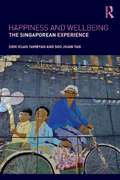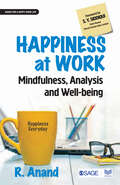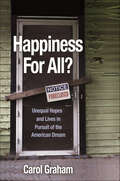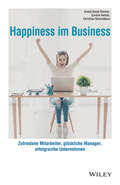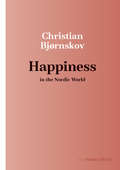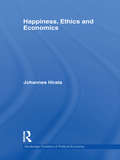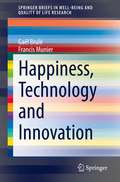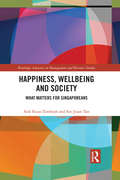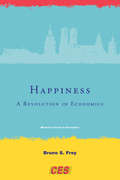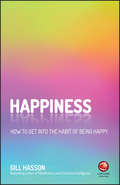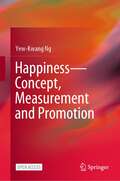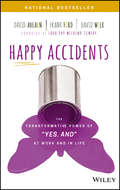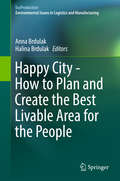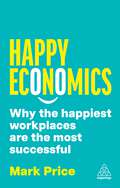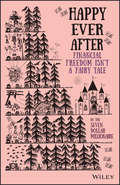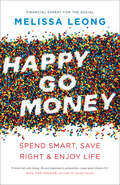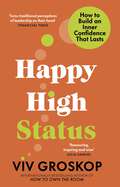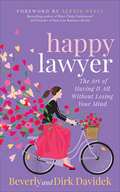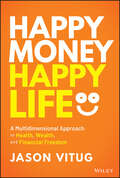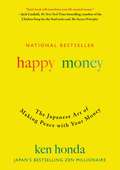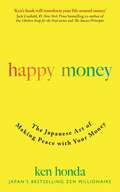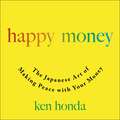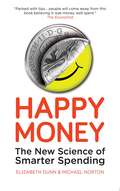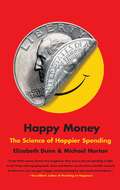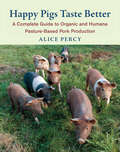- Table View
- List View
Happiness and Wellbeing: The Singaporean Experience (Routledge Advances in Management and Business Studies)
by Siok Kuan Tambyah Soo Jiuan TanThis book is part of the continuing research on quality of life issues conducted by its authors, and builds on past research on the values and lifestyles of Singaporeans (published in 1999 and 2004) and the wellbeing of Singaporeans (published in 2009). It focuses on the happiness and wellbeing of Singaporeans and details the findings of a large-scale quality-of-life survey of 1500 Singapore residents in 2011 (the QOL 2011 Survey). This comprehensive study provides insights into Singaporeans’ general life satisfaction and satisfaction with their life domains, happiness, enjoyment, achievement, emotional wellbeing, psychological wellbeing, economic wellbeing, overall wellbeing, happiness, enjoyment, achievement, personal values, spirituality, value orientations, national identity, and satisfaction with rights. In addition, the QOL 2011 Survey builds on previous nation-wide surveys in 1991, 1996, and 2001, thus providing a longitudinal perspective into how the various aspects of the wellbeing of Singaporeans have evolved through the years. This book aims to provide a comprehensive reference for academics, practitioners, policy makers, researchers, and students who are interested in the subject of happiness and wellbeing in Singapore. It can also be used as a reference for other countries who are interested to promote happiness and wellbeing of their nations.
Happiness at Work: Mindfulness, Analysis and Well-being
by R. AnandA handful of stressors and internal psychodynamics derail the happiness of normal people like you and me. Fortunately, rigorous science and psychology can be applied to this problem. Happiness at Work: Mindfulness, Analysis and Well-being tells you what to apply, how to apply and why it works. It is utterly simplistic to wish away external stressors. However, are you taking the best decisions about them? Everyone gets some of their decisions wrong, aver the behavioral economists, as universal distortions are always at work. We can deploy some decision-making paradigms to minimize these distortions. We are beset with individual distortions too, as we are wired with certain tendencies and default modes. As soon as you understand the source and dynamics of these individual distortions, you would begin to heal. Your everyday errors, interpersonal interactions, nighttime dreams and body language, all give useful clues to this wiring. On top of this insight, you can build a fine temperament of mindfulness about your body, mind and interactions as well as your entire life. This would lead to peak emotional and mental wellness. Even as professionals leading busy lives, you would see the signs of progress yourself, in weeks and months. This is what ‘happiness at work’ is all about.
Happiness for All?: Unequal Hopes and Lives in Pursuit of the American Dream
by Carol GrahamHow the optimism gap between rich and poor is creating an increasingly divided societyThe Declaration of Independence states that all people are endowed with certain unalienable rights, and that among these is the pursuit of happiness. But is happiness available equally to everyone in America today? How about elsewhere in the world? Carol Graham draws on cutting-edge research linking income inequality with well-being to show how the widening prosperity gap has led to rising inequality in people's beliefs, hopes, and aspirations.For the United States and other developed countries, the high costs of being poor are most evident not in material deprivation but rather in stress, insecurity, and lack of hope. The result is an optimism gap between rich and poor that, if left unchecked, could lead to an increasingly divided society. Graham reveals how people who do not believe in their own futures are unlikely to invest in them, and how the consequences can range from job instability and poor education to greater mortality rates, failed marriages, and higher rates of incarceration. She describes how the optimism gap is reflected in the very words people use—the wealthy use words that reflect knowledge acquisition and healthy behaviors, while the words of the poor reflect desperation, short-term outlooks, and patchwork solutions. She also explains why the least optimistic people in America are poor whites, not poor blacks or Hispanics.Happiness for All? highlights the importance of well-being measures in identifying and monitoring trends in life satisfaction and optimism—and misery and despair—and demonstrates how hope and happiness can lead to improved economic outcomes.
Happiness im Business: Zufriedene Mitarbeiter - glückliche Manager - erfolgreiche Unternehmen
by Christian Schmidkonz André Daiyû Steiner Carolin HefeleGlück im Business zahlt sich aus. Es wird Zeit, dass sich Unternehmen ernsthaft damit auseinandersetzen. Eine Möglichkeit dazu bieten die Autoren André Daiyû Steiner, Carolin Hefele und Prof. Dr. Christian Schmidkonz. Ihr Buch soll den Leser in die Welt des Glücks und der Erfüllung im Business-Kontext einführen. Dabei werden zum Beispiel die Begriffe Glück, Zufriedenheit, Erfüllung erarbeitet. Außerdem liefert das Buch eine philosophische und psychologische Deutung des Glücks: Wie funktioniert Glück im Unternehmen? Ist es erstrebenswert in einem glücklichen Unternehmen zu arbeiten? Welche Wege gibt es zum glücklichen Manager? Ist eine Glücksstrategie ein Wettbewerbsvorteil für ein Unternehmen? Auch neueste Erkenntnisse der Neuro-Wissenschaft fließen in das Buch ein. Dass Wirtschaft und Glück zusammengehören sollten, belegen die Autoren durch ihre Auseinandersetzung mit Themen wie Leadership, Arbeit, Verkauf, Marketing und Ökonomie. Ein Praxisteil mit Glücksübungen rundet das Buch ab.
Happiness in the Nordic World (Nordic World)
by Christian BjørnskovDenmark is consistently among the countries with the happiest and most satisfied populations, and it regularly places at the very top with the rest of the Nordic countries in international surveys. Why do the Nordic countries as a whole constitute the happiest region in the world? Many experts attribute the region's high levels of happiness to factors such as greater relative national wealth and well-functioning institutions. Yet, a number of other countries in Europe and parts of Asia share those qualities and rank far lower in life satisfaction. Others credit the region's high levels of happiness to its welfare state model, but these have changed considerably over time—and Iceland does not share this feature. Instead, economist Christian Bjørnskov argues that the most important factor to come out of international comparisons is the importance of social trust—the ability to trust other people one does not know personally. The populations in three of the five countries are also characterized by a very strong sense of personal freedom. These two key factors contribute to a fuller and richer life. Bjørnskov ends by discussing to what extent these factors can be exported to other parts of the world.
Happiness, Ethics and Economics (Routledge Frontiers Of Political Economy Ser. #142)
by Johannes HirataDespite decades of empirical happiness research, there is still little evidence for the positive effect of economic growth on life satisfaction. This poses a major challenge to welfare economic theory and to normative conceptions of socio-economic development. This book endeavours to explain these findings and to make sense of their ethical implications. While most of the existing literature on empirical happiness research is ultimately interested in understanding how to improve human lives and societal development, the ethical backdrop against which these findings are evaluated is rarely made explicit. In contrast to this, Professor Hirata focuses on the role happiness should play in an ethically founded conception of good development. Taking a development ethics perspective, this book proposes a nuanced conception of happiness that includes both its affective and its normative dimensions and embeds this in a comprehensive conception of good development. The argument is that happiness should not be regarded as the only thing that determines a good life and that good development cannot sensibly be thought of as a matter of maximizing happiness. Happiness should rather be seen as an important indicator for the presence or absence of those concerns that really matter to people: the reasons that give rise to happiness. This book should be of interest to students and researchers of economics, psychology and development studies.
Happiness, Technology and Innovation (SpringerBriefs in Well-Being and Quality of Life Research)
by Gaël Brulé Francis MunierThis book asks what kind of impacts innovations and technology have on subjective well-being and happiness. It presents the state of the art both in terms of results and theoretical questioning on these topics. It proposes a new concept: innovation that leads to greater happiness, and highlights new research in this area. In so doing, it addresses a less researched area in the field of well-being research. The authors state that notwithstanding the indisputable positive contributions of innovation and technology, there are also drawbacks, which need equal attention in research. This book is of interest to students and researchers of quality of life and well-being, as well as innovation research.
Happiness, Wellbeing and Society: What Matters for Singaporeans (Routledge Advances in Management and Business Studies)
by Siok Kuan Tambyah Soo Jiuan TanAs Singapore continues to grow as a nation, the happiness and wellbeing of Singaporeans and what matters to them also change. This book conceptualizes and measures the cognitive and affective aspects of subjective wellbeing from multiple perspectives and relates these to important factors such as values, trust, democratic rights, views about politics and the role of the government. Through nationwide surveys using representative samples, including insights from the most recent 2016 Quality of Life (QOL) Survey, this book examines how happiness and subjective wellbeing have evolved over the past 20 years in Singapore. This book is an invaluable resource for those interested in how the study of happiness and wellbeing in Singapore connects with and contributes to the ongoing research and discourse on happiness and wellbeing around the world.
Happiness: A Revolution in Economics (Munich Lectures in Economics)
by Bruno S. FreyA leading economist discusses the potential of happiness research (the quantification of well-being) to answer important questions that standard economics methods are unable to analyze.Revolutionary developments in economics are rare. The conservative bias of the field and its enshrined knowledge make it difficult to introduce new ideas not in line with received theory. Happiness research, however, has the potential to change economics substantially in the future. Its findings, which are gradually being taken into account in standard economics, can be considered revolutionary in three respects: the measurement of experienced utility using psychologists' tools for measuring subjective well-being; new insights into how human beings value goods and services and social conditions that include consideration of such non-material values as autonomy and social relations; and policy consequences of these new insights that suggest different ways for government to affect individual well-being. In Happiness, emphasizing empirical evidence rather than theoretical conjectures, Bruno Frey substantiates these three revolutionary claims for happiness research. After tracing the major developments of happiness research in economics and demonstrating that we have gained important new insights into how income, unemployment, inflation, and income demonstration affect well-being, Frey examines such wide-ranging topics as democracy and federalism, self-employment and volunteer work, marriage, terrorism, and watching television from the new perspective of happiness research. Turning to policy implications, Frey describes how government can provide the conditions for people to achieve well-being, arguing that a crucial role is played by adequate political institutions and decentralized decision making. Happiness demonstrates the achievements of the economic happiness revolution and points the way to future research.
Happiness: How to Get Into the Habit of Being Happy
by Gill HassonGet into the habit of being happy! We may all have different abilities, interests, beliefs and lifestyles, beliefs but there is one thing that we all have in common: We want to be happy! Happiness shows you how to be happy by adopting lifelong “happiness habits” that bring and fulfilment and pleasure to your days. These habits will help you manage life’s inevitable ups and downs; consistent practice will develop your happiness abilities and help you live the happy life you want. Aristotle believed that happiness was comprised of pleasure and a sense of life well-lived. Today’s research agrees, suggesting that “happiness” is defined by your overall satisfaction with your life as well as how you feel from day to day. This book shows you that happiness is a skill made up of a particular set of habits that you can bring in your life starting today. Identify your own, personal definition of “happiness” Learn why we need to be happy and what often gets in the way Develop habits that help you create and maintain happiness long-term Learn how to be happy when you’re stuck in an unhappy situation Discover the often-overlooked happiness that surrounds you every day While happiness is not feeling good all the time you do have the ability to control how you feel Happiness gives you the skills and perspective to recognise happiness and pursue a happy life—whatever that may mean for you.
Happiness—Concept, Measurement and Promotion
by Yew-Kwang NgThis open access book defines happiness intuitively and explores several common conceptual mistakes with regard to happiness. It then moves on to address topical issues including, but not limited to, whether money can buy you happiness, why happiness is ultimately the only thing of intrinsic value, and the various factors important for happiness. It also presents a more reliable and interpersonally comparable method for measuring happiness and discusses twelve factors, from A to L, that are crucial for individual happiness: attitude, balance, confidence, dignity, engagement, family/friends, gratitude, health, ideals, joyfulness, kindness and love. Further, it examines important public policy considerations, taking into account recent advances in economics, the environmental sciences, and happiness studies. Novel issues discussed include: an environmentally responsible happy nation index to supplement GDP, the East Asian happiness gap, a case for stimulating pleasure centres of the brain, and an argument for higher public spending.
Happy Accidents: The Transformative Power of "Yes, and" at Work and in Life
by David Ahearn David Wilk Frank FordStop saying 'no' to opportunity, and start saying 'yes' to possibility Happy Accidents is your personal guide to transforming your life. As we take on task after task, responsibility after responsibility, we lose sight of who we are and why we're doing what we do; we rush through the day completing a to-do list, but we never really seem to accomplish the things that are most important. What goals do you have for your life? What steps have you taken toward them today? Consider this book your guide to getting back on track to your dreams and help inspire those around you. It's not about doing more or doing less, it's about making what you do worthy of the effort. From forging new relationships, stepping out of your comfort zone, and reframing your work—start valuing these as empowering choices you get to make toward a particular goal every day. To preserve our precious time and energy, we often default to 'no,' yet this only closes the door to our growth, while a 'yes' opens up a world of possibilities. The secret is adding 'yes, and' to our lives. This seductively simple turn of phrase opens the doors to better collaboration and positive relationships, and invites self-sustaining opportunities into our world. 'Yes, and' helps you get from where you are, as an individual or organization, to where want to be. No person or organization is an island, and none of us reaches our goals alone. This book shows you how to build on the power of open-mindedness, cultivate supportive relationships, and adopt a win-win mindset to reignite your purpose and unleash your best. Harness the power of team collaboration, cooperation, and creativity Reframe 'mistakes' and 'bad ideas' into 'Happy Accidents' that lead to opportunities Communicate more effectively by learning how to listen actively and build on the pertinent information Relinquish some degree of control to allow for more growth and discovery Children have a natural inclination toward curiosity. As we grow into adults, our curiosity gradually takes a back seat to obligations, responsibility, and duty—but that spark remains, and can be reignited. Don't spend your life adrift in a sea of 'could've, would've, should've'—take back your sense of purpose, positivity, joy, time, and energy with the power of Happy Accidents.
Happy City - How to Plan and Create the Best Livable Area for the People
by Anna Brdulak Halina BrdulakThis book presents multi-sector practical cases based on the author's own research. It also includes the best practice, which could serve as a benchmark for the creation of smart cities. The global urbanisation index, i. e. , the ratio of city dwellers to the total population, has been steadily increasing in recent years. It is highest in the Americas, followed by Europe, Asia and Africa. The city of the future will combine the intelligent use of IT systems with the potential of institutions, companies and committed, creative inhabitants. The administrative boundaries of today's cities put certain constraints on their further growth, but in the future these boundaries will no longer be as relevant. Cities in Europe face the challenge of reconciling sustainable urban development and competitiveness - a challenge that will likely influence issues of urban quality such as the economy, culture, social and environmental conditions, changing a given city's profile as well as urban quality in terms of its composition and characteristics.
Happy Economics: Why the Happiest Workplaces are the Most Successful
by Mark PriceHappiness at work matters. But what does happiness mean? How can managers measure it and have more of it? And what happens to organizations when they get happiness right? Ask anyone. Happiness and wellbeing are important for all organizations, because they undeniably lead to economic happiness and financial success for everyone involved. But how does happiness drive growth and how should business leaders develop happier companies? In Happy Economics, business expert Mark Price clearly demonstrates why the opportunity represented by happiness is huge for businesses. Using real-world examples of those organizations who have got it right, he explains what happy economics is, why happiness metrics matter, connects high happiness with high performance, explores how to create happy teams and creating a corporate happiness plan that can be used by any business.
Happy Ever After: Financial Freedom Isn't a Fairy Tale
by Seven Dollar MillionaireDiscover how financial freedom – and not fairy tales – is at the heart of your very own Happy Ever After Did you know you can become a millionaire by saving just $7 a day and investing for 7% returns? Probably not, because financial literacy is a subject that’s overlooked by the vast majority of schools and universities, despite its importance to every single person on the planet. Written initially for a teenage daughter and then turned into a course to train migrant workers, Happy Ever After: Financial Freedom Isn’t a Fairy Tale focuses on the fundamentals of understanding money, saving and investing, showing how the "magic" of compound investing can transform tiny initial amounts into genuine wealth. Finally, it shows readers how to achieve the "Freedom Formula" of 25x your annual spending – that can set you free. Perfect for anyone who hopes to make their future financially brighter than their present, or help their own children avoid mistakes they made, Happy Ever After has a playful tone, featuring a spoiled princess and talking frog, hand-illustrated to help explain some of the trickier ideas that can help change your life.
Happy Go Money: Spend Smart, Save Right & Enjoy Life
by Melissa LeongFeatured on The Drew Barrymore Show. The Social&’s finance expert gives practical advice on how to spend, budget, invest, and feel good about money. Can money buy happiness? Maybe, but not like you may think . . . With Happy Go Money, financial expert Melissa Leong cuts through the noise to show you how to get the most delight for your dollar. Happy Go Money combines happiness psychology and personal finance and distills it into an indispensable starter guide. Each snappy chapter provides practical, easy-to-understand advice on topics such as spending, budgeting, investing, and mindfulness, while weaving in research, interactive exercises, and relatable anecdotes. Frank, funny, and empowering, this primer challenges everyone to revamp their relationship with their money so they can dial down their worries and supersize their joy. &“Using humor and kindness, Leong shares a lovely starter guide to living a happier life with a better relationship to your money.&” —Book Riot &“A book that puts money, life and happiness in perspective. Loved every minute of it.&” —Gail Vaz-Oxlade, author of Debt-Free Forever &“Happy Go Money is informative but also accessible, smart and funny, silly and sexy, tough and also kind. It is, perhaps, the way money has always wanted to be represented. Melissa Leong has given her a makeover—and she looks SO good.&” —Elaine Lui, LaineyGossip.com, and author of Listen to the Squawking Chicken &“A must-read for anyone who wants to fall in love with their money.&” —Shannon Lee Simmons, founder of the New School of Finance &“Leong&’s breezy, relatable writing style will appeal to a broad range of readers.&” —Booklist
Happy High Status: Get the secret to lasting confidence, from the bestselling author of How to Own the Room
by Viv GroskopRedefine what confidence looks like at home and at work.Everyone wants to be able to face challenging situations without feeling daunted, intimidated or stressed. But no-one wants to be labelled over-confident, arrogant or smarmy, or to get caught up in their own hype. So how can you feel authentically confident - without the cringe, and without pretending to be something you're not?Happy high status is a new way of thinking about confidence and how you relate to yourself. It's how actors and comedians enhance their presence on stage and screen. It lends strength and energy to your interactions, big and small, and is a way of projecting status, minimising self-doubt and moving effortlessly through life.Drawing on research, practical tips and lessons from the worlds of comedy, film, television, politics and sport, Viv Groskop offers a masterclass in how you can access this new form of confidence at any time. All, crucially, with no risk of anyone thinking that you are your own biggest fan."Viv always makes me feel more confident. Get the magic now in book form" - Katy Brand"I recommend Viv Groskop to anyone wanting more self-confidence" - Philippa Perry"Reassuring, inspiring and wise - a practical handbook for anyone held back by self-doubt" - Julia Samuel
Happy Lawyer: The Art of Having It All Without Losing Your Mind
by Beverly Davidek Dirk DavidekHow you can make use of your law degree—without making yourself miserable. When they enter the field, lawyers seem to have it made—with a high-salary, high-status profession that should set them up for life. Yet, even when they seem to have it all, they often start to feel like something&’s off. Their careers have become horribly soul-sucking. They&’re managing their lives, sort of—but they feel duped. Trapped. Their &“good job&” is affecting their health and relationships—and they&’re just trying to keep all the plates spinning. Here&’s the good news: Beverly Davidek has been there, and in this book she and husband Dirk show how you can find a job that allows for happiness, satisfaction, and peace of mind. If you&’re still struggling to find a way to provide for your family without losing yourself, this book is for you. Part Ask and It Is Given and part What Color Is Your Parachute? (but written specifically for lawyers), Happy Lawyer gives you the tools you need to get unstuck in your career and start living your dream.
Happy Money Happy Life: A Multidimensional Approach to Health, Wealth, and Financial Freedom
by Jason VitugTransform your relationship with money into one that powers true wellbeing. Money can buy happiness when you spend it on wellness. In Happy Money Happy Life: A Multidimensional Approach to Health, Wealth, and Financial Freedom, celebrated writer, speaker, and entrepreneur Jason Vitug delivers an exciting and practical discussion at the intersection of our mental and emotional health and our money. You’ll explore the importance of physical and spiritual wellbeing, the interconnectedness of environmental comfort, meaningful work, and social connections as you learn to live a healthier, wealthier, and happier life. With insightful takeaways from happiness research, you’ll understand how money weaves itself into every aspect of your life and how you can masterfully use it to choose happiness. In the book, you’ll find: Descriptions of the 8 dimensions of wellness and a hands-on framework you can use to achieve your financial and life goals 4 key principles to living a happier life A holistic strategy for transforming your relationship with money into one that improves every aspect of your wellbeing An indispensable roadmap to mental strength, physical health, financial success, and emotional intelligence, Happy Money Happy Life is ideal for professionals, managers, workers, executives, and other business leaders ready to explore the possibility that life is about joy and happiness, not merely titles and salaries.
Happy Money: The Japanese Art of Making Peace with Your Money
by Ken HondaWhat Marie Kondo’s The Life-Changing Magic of Tidying Up did for your living space, Ken Honda’s Happy Money will do for your wallet.Ken Honda—Japan’s #1 bestselling personal development guru—knows that getting rich quick is no way to achieve happiness. Too often, money is a source of fear, stress, and anger, often breaking apart relationships and even ruining lives. We like to think money is just a number or a piece of paper, but it is so much more than that. Money has the ability to smile, it changes when it is given with a certain feeling, and the energy with which it imbues us impacts not only ourselves, but others as well. Although Ken Honda is often called a “money guru,” his real job over the past decade has been to help others discover the tools they already possess to heal their own lives and relationships with money. Now, in practical and accessible language, the “Zen millionaire” explains how to achieve peace of mind when it comes to money. Learn how to treat money as a welcome guest, allowing it to come and go with respect and without resentment; understand and improve your money EQ; unpack the myth of scarcity; and embrace the process of giving money, not just receiving it. This book isn’t to fix you, because as Ken Honda says, you’re already okay!
Happy Money: The Japanese Art of Making Peace with Your Money
by Ken HondaLook around you - what do you see? You may discover to your surprise that the people who are most at peace with money are the ones who walk nimbly between having too little and having too much. They have found a balance between indulgence and austerity; between success and happiness; between motivation and inspiration; and between any number of other poles we tend to think of as either/or choices, but which in reality are simply posts on either side of a doorway through which we must pass.For many of us the subject of money is unavoidably stressful. Managing our personal finances is complicated, time consuming and often, particularly in the slow countdown to pay day, dispiriting. The good news is that in Japan - where a Zen approach to life is more widely practiced - a pathway to a better relationship with money is being carved, by Ken Honda.This beautifully written book will reinvent the way you see your personal finances. You will come to understand that money flows like water and arrives like a guest. You'll rethink your own attitudes and examine the way they were shaped by beliefs about money you were taught as a child. When we heal the fear and anxiety we have about money, we successfully achieve prosperity and peace. Take the zen path to financial security and happiness.
Happy Money: The Japanese Art of Making Peace with Your Money
by Ken HondaFollow the zen path to happiness with money, based on the Japanese bestseller which has sold 1 million copies!Look around you - what do you see? You may discover to your surprise that the people who are most at peace with money are the ones who walk nimbly between having too little and having too much. They have found a balance between indulgence and austerity; between success and happiness; between motivation and inspiration; and between any number of other poles we tend to think of as either/or choices, but which in reality are simply posts on either side of a doorway through which we must pass.For many of us the subject of money is unavoidably stressful. Managing our personal finances is complicated, time consuming and often, particularly in the slow countdown to pay day, dispiriting. The good news is that in Japan - where a Zen approach to life is more widely practiced - a pathway to a better relationship with money is being carved, by Ken Honda.This beautifully written book will reinvent the way you see your personal finances. You will come to understand that money flows like water and arrives like a guest. You'll rethink your own attitudes and examine the way they were shaped by beliefs about money you were taught as a child. When we heal the fear and anxiety we have about money, we successfully achieve prosperity and peace. Take the zen path to financial security and happiness.(P) 2019 Hodder & Stoughton Ltd
Happy Money: The New Science of Smarter Spending
by Michael Norton Elizabeth DunnAfter a fairly low threshold, income and material wealth have no measurable effect on happiness. But how we spend our money does. In this groundbreaking book, Dr Elizabeth Dunn and Dr Michael Norton explain the secret to "happiness-efficient" spending. Using their own cutting-edge research, they reveal: Why it's better to buy concert tickets instead of a new iPhone Adverts actually make television more enjoyable Why you should book your next holiday many months in advance How "time affluence" is more important than a fat pay cheque Why charitable giving is the best investment you can make A rare combination of informed science writing, wit, and practical pointers for a flourishing life, Happy Money will help you to be more fulfilled for less.
Happy Money: The Science of Happier Spending
by Michael Norton Elizabeth DunnTwo professors combine their fascinating and cutting-edge research in behavioral science to explain how money can buy happiness--if you follow five core principles of smart spending.Most people recognize that they need professional advice on how to earn, save, and invest their money. When it comes to spending that money, most people just follow their intuitions. But scientific research shows that those intuitions are often wrong.Happy Money offers a tour of research on the science of spending, explaining how you can get more happiness for your money. Authors Elizabeth Dunn and Michael Norton have outlined five principles--from choosing experiences over stuff to spending money on others--to guide not only individuals looking for financial security, but also companies seeking to create happier employees and provide "happier products" to their customers. Dunn and Norton show how companies from Google to Pepsi to Charmin have put these ideas into action.Along the way, Dunn and Norton explore fascinating research that reveals that luxury cars often provide no more pleasure than economy models, that commercials can actually enhance the enjoyment of watching television, and that residents of many cities frequently miss out on inexpensive pleasures in their hometowns. By the end of this "lively and engaging book" (Dan Gilbert, author of Stumbling on Happiness), you'll be asking yourself one simple question every time you reach for your wallet: Am I getting the biggest happiness bang for my buck?
Happy Pigs Taste Better: A Complete Guide to Organic and Humane Pasture-Based Pork Production
by Alice PercyWhat does it take to raise a happy pig? Armed with experience from running the largest organic hog operation in Maine, author Alice Percy is well equipped to answer this question.Pigs are much closer to their cousin, the wild boar, than other domesticated animals. Ethically managing pigs requires an understanding of their natural mannerisms, including factors such as social grouping, mating, territory, housing, and, of course, their love of wallowing in the mud.In Happy Pigs Taste Better Percy offers a comprehensive look at raising organic, pasture-fed, gourmet meat. She advises readers on pasturing and feeding hogs organically, as well as managing the breeding herd and administering effective natural healthcare. In addition, she provides an overview of marketing and distribution for those looking to turn their hog farming operation into a lucrative business.This book is the first of its kind to offer an in-depth approach to organic, high-welfare commercial production, including information on:– Designing a hog business from the ground up– Housing pigs, including benefits and drawbacks of various housing systems– Evaluating the nutritional content of common organic feedstuffs– Butchering humanely and economically– Recordkeeping, with templates for financial trackingWhether you&’re looking to convert a conventional operation to organic, grow your backyard hog operation into a viable business, or start from scratch, this comprehensive book has got you covered, nose to tail.
